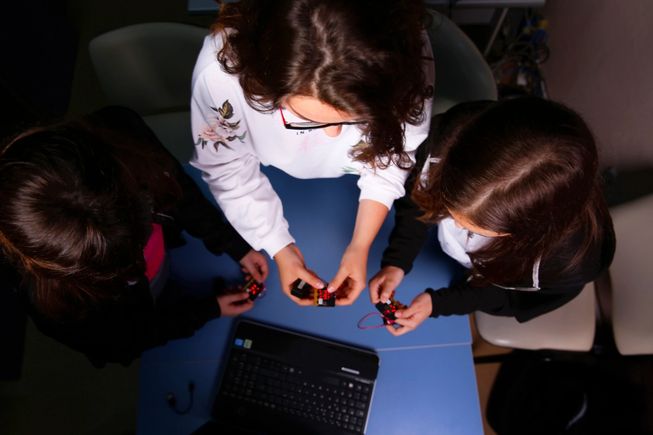British Council
The BBC micro:bit is being used in schools throughout the Western Balkans region as part of the 21st Century Schools programme, run by The British Council with the support of Micro:bit Educational Foundation.

21st Century Schools is a £10-million programme funded by the UK Government's Foreign Commonwealth Office (FCO), which will bring innovative teaching practices and technology to every school in the Western Balkans region.
The initiative focuses on the implementation of core skills, such as digital literacy, collaboration and communication, creativity and imagination and student leadership. Teachers in Albania, Bosnia & Herzegovina, Kosovo, Montenegro, North Macedonia and Serbia will receive training in these core skills to broaden their teaching practice, while learning how to implement the micro:bit and inspire coding, problem solving and critical thinking skills in students aged 10 – 15.
Pilot phase
The pilot phase of which began in 2017 and reached 60 primary schools, 550 teachers in STEAM subjects and 60 school principals across the region. All participants underwent five days of training, including introducing computational thinking concepts and coding on the micro:bit into teaching and learning practice.
To support teacher training in each country, a cohort of national core skill trainers were trained by British Council experts and Micro:bit Educational Foundation staff, before going into their respective countries to work with schools and leadership.
Programme goals
The formal programme launched in Montenegro in early 2019, with the teacher training programme commencing its first cycle of 900 schools in April 2019.
By the end of the project, the aim is to have implemented least one functional classroom per school, of 4500 in the region, to fully support lessons in coding and using micro:bit. This includes computers that have the latest browser to support working with online coding editors. Depending on the size of the school, primary schools will also receive between 10 to 60 micro:bit devices per school, with access provided to up to a million children.
The high-level goals of the project are to:
- Improve teaching and learning practice for 1 million children in the region
- Establish provision of core skills for teachers and school leaders across 4500 schools
- Support lasting policy and curriculum change to support computing education throughout the region
Training and resources
- Course materials for 21st Century Schools programme, including online lesson plans and video resources, aim to offer an easy-to-access, well-paced range of content to introduce users to the micro:bit
- A workshop and training programme for teachers focuses on capacity-building and core skills of and will be made available from summer 2020
- In partnership with Code Club, the Micro:bit Educational Foundation provided a tailor-made 10-week curriculum which will be made available in classrooms and extra-curricular contexts
- To support practical use of Python with micro:bit , Petjla - a subject specialist organisation for computing – created units of lessons based on the micro:bit with Python for grade 7 (age 12 – 13)
Impact and research
A study into the 2017-2018 pilot programme found that:
- 86% of teachers believe the micro:bit is useful for delivering currriculum
- 90% believe the device will inspire students about coding
- 93% found it would be inspiring for students in the classroom
- 100% felt micro:bit was a useful teaching tool
A longitudinal impact study into the 21st Century Schools programme is underway by London School of Economics (LSE) to monitor and evaluate the long-term effects of the teaching programme on practice and outcomes in the region.